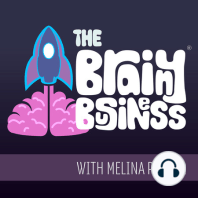59 min listen

281. Outsmart Your Brain with Dan Willingham
FromThe Brainy Business | Understanding the Psychology of Why People Buy | Behavioral Economics
281. Outsmart Your Brain with Dan Willingham
FromThe Brainy Business | Understanding the Psychology of Why People Buy | Behavioral Economics
ratings:
Length:
53 minutes
Released:
Apr 21, 2023
Format:
Podcast episode
Description
In today's conversation, I am joined by Dr. Dan Willingham, a memory expert with a Ph.D. in Cognitive Psychology from Harvard. Dan’s new book Outsmart Your Brain (which we discuss today) will change your life. While the book is catered to K-16 learners (for example, it includes chapters on “how to take notes,” “how to listen to a lecture,” “how to read hard books,” and “how to take tests”) trust me when I say this book is for you and everyone you know. It is fascinating and will help you with any presentation you may give or meeting you will be in moving forward. Trust me, you’re gonna love this. A little more about Dan: His work has appeared in the Washington Post, The New York Times, and many other publications, and he is the author of several books – his writing has appeared in 18 languages! In 2017 he was appointed by President Obama to serve as a Member of the National Board for Education Sciences. Whether you want to be a better learner yourself or if you have kids (including college students) in your life whom you want to help be successful, this episode and book are for you. I can't wait to dive into this one because there is so much great stuff. Show Notes: [00:43] In today's conversation, I am joined by Dr. Dan Willingham. Dan earned his Ph.D. in Cognitive Psychology from Harvard University in 1990. [03:03] Dan shares about himself, his background, and the work he does. He was trained as a cognitive psychologist. [04:04] He shares his transition from basic researcher to applied researcher. [07:02] Often, we assume people know that thing that we know so we miss key things when presenting. That means they don’t get value from your talk. [08:41] There are things we know we should do that we find difficult to implement. Sometimes we really don’t know what is optimal to do. We tend to do things in the moment that we feel are working and are not that difficult. (But often, the harder/counterintuitive thing will make a much bigger impact.) [11:16] Does cramming work? Dan says, “kind of.” It depends on what your goals are. If you do not care about remembering something in the long term then crowding it all in right before you need to perform is actually fine. [12:50] The only way to ensure that you remember things in the long term is if your learning happens over time rather than all crammed together. [15:42] If you are trying to master a new skill or a new topic and you feel like you need to wait to start until you have more than small bits of time, don’t wait! The data shows this is actually optimal for learning and retention. [18:2326] Creating that consistent study or work habit by time and not by task is very important. [21:04] We all procrastinate. It is a natural tendency. [22:37] The key thing is you have to give yourself permission to stop if you want to. [24:26] The night of sleep is important in consolidating the memories that were formed during the day. If you don’t get much sleep or you get low-quality sleep you are tampering with the learning that you put so much time into the previous day. [25:40] Your intention or your desire to learn contributes nothing to whether or not you will learn something. There are lots of things we want to remember but don’t. [27:26] Memory loves meaning. That is the main way we remember. [29:05] You draw memory out the same way that it went in. [30:53] Memories are going to be queued by thoughts or by things in the environment later. The way you are going to be able to draw memories out most successfully is when the queue is a good match for the way you thought about the memory at the time you were trying to remember it. [32:51] When you are storing something away, think to yourself, “How am I likely later to try and remember this?” and make that part of the way it becomes retrievable. [35:48] How do you organize 94 tips in one book? He chose to sort them by task. It is organized by things you would do that entail learning (how to read hard books, how to take note
Released:
Apr 21, 2023
Format:
Podcast episode
Titles in the series (100)
19. Herding: Come On And Listen…Everyone Else Is Doing It: Herding is the topic of today’s behavioral economics podcast foundations episode. This concept is similar to the way animals herd and for many of the same reasons. For safety, being in the center of the herd offers protection from predators. There... by The Brainy Business | Understanding the Psychology of Why People Buy | Behavioral Economics